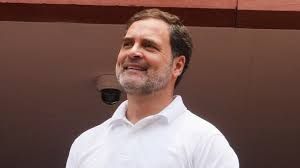Rahul Gandhi questions govt silence on ‘manipulation’ by Jane Street

Rahul Gandhi Questions Government’s Silence on Jane Street Market Manipulation Allegations
Opposition Leader Demands Accountability and Transparency from SEBI and Modi Government
In a sharp critique of the Modi government’s silence, Congress leader Rahul Gandhi has raised serious concerns over alleged market manipulation involving global trading giant Jane Street. The issue has sparked widespread debate within political and financial circles, especially after the Securities and Exchange Board of India (SEBI) issued a damning interim order accusing the firm of manipulating Indian stock markets.
SEBI Alleges Massive Derivatives Manipulation
Earlier this month, SEBI unveiled allegations against the US-based firm Jane Street, accusing it of manipulating prices in the Indian futures and options (F&O) market. According to the regulator, Jane Street and its affiliate entities orchestrated a complex strategy to distort prices in Bank Nifty derivatives, generating profits estimated at over ₹4,800 crore.
The regulator not only barred the firm from trading in Indian markets but also froze its earnings, stating that Jane Street’s activities created artificial volatility. SEBI’s investigation described the scheme as “a calculated, manipulative enterprise designed to extract profits at the expense of market integrity.”
While Jane Street has denied any wrongdoing and stated its intent to challenge the order, the seriousness of the accusations has drawn strong reactions from market analysts, political leaders, and investor protection groups.
Rahul Gandhi Sounds Alarm, Cites 2024 Warnings
Reacting to the developments, Rahul Gandhi posted on social media platform X (formerly Twitter), drawing attention to his prior warnings about the risks of unregulated speculation in India’s derivatives market. He wrote in Hindi:
“I had clearly warned in 2024 that the F&O market has become a playground for large players, draining the savings of small investors. Now SEBI itself is acknowledging that Jane Street manipulated trades worth thousands of crores. Why did SEBI remain silent until now? At whose behest did the Modi government turn a blind eye?”
Gandhi’s post not only criticized SEBI’s delayed action but also raised uncomfortable questions about the government’s role—or lack thereof—in safeguarding retail investors from such alleged financial malpractices.
Silence from Government Raises Eyebrows
The Congress leader’s remarks come amid growing unease over the government’s silence on the issue. Despite the magnitude of the allegations and the global attention they’ve drawn, no official statement has been issued by the Finance Ministry or the Prime Minister’s Office.
For Rahul Gandhi and the Opposition, this silence signals more than bureaucratic hesitation—it points to a systemic reluctance to challenge powerful market players. “The government has failed in its fiduciary duty to protect small investors,” said senior Congress spokesperson Jairam Ramesh. “This isn’t just a case of financial fraud. This is about the erosion of trust in India’s market institutions.”
Jane Street to Contest SEBI Charges
Jane Street, known globally for its quantitative trading operations, has responded by rejecting SEBI’s findings and accusing the regulator of mischaracterizing its trading strategies. In a statement, the firm said:
“We believe SEBI has misunderstood the data and misrepresented the nature of our transactions. We are fully cooperating and intend to challenge the interim order through appropriate legal channels.”
Legal experts note that while SEBI’s order is interim in nature, the scale of the action—including a massive asset freeze and trading ban—indicates the seriousness of the charges. The case could evolve into one of the most high-profile regulatory battles in Indian capital market history.
The Bigger Picture: F&O Markets Under Scrutiny
Rahul Gandhi’s critique also places broader scrutiny on India’s F&O markets. The segment has seen a dramatic rise in volume over the past five years, largely driven by retail participation. However, financial experts have frequently cautioned that derivatives trading, while profitable for large institutional players, carries high risks for small investors.
In 2023, a report by the Reserve Bank of India noted that 9 out of 10 retail traders in F&O segments incurred losses. Many investor advocates have called for tighter regulations, increased margin requirements, and stricter monitoring of foreign institutional players.
A Political Flashpoint?
The Jane Street case could emerge as a fresh political flashpoint, especially if Parliament takes up the issue in the upcoming Monsoon Session. With Rahul Gandhi and the Opposition intensifying their campaign on issues of inequality and financial accountability, the controversy could provide further ammunition against the ruling Bharatiya Janata Party (BJP).
Speaking to reporters, Gandhi emphasized, “When crores of rupees are siphoned off through manipulation and the government says nothing, it’s clear who the system is working for. Not the poor. Not the middle class. But the rich and well-connected.”
What Lies Ahead?
As SEBI continues its investigation and Jane Street prepares to mount its legal defense, the case raises serious questions:
- Are India’s market surveillance mechanisms robust enough to detect such manipulations in real-time?
- Why was action delayed until now, despite visible anomalies in trading patterns?
- And most importantly, will SEBI disclose the names of all involved “big players,” as demanded by Rahul Gandhi?
These questions will likely dominate headlines in the coming weeks, especially if opposition parties demand a Joint Parliamentary Committee (JPC) probe or seek SEBI officials’ testimony before a financial oversight panel.
Conclusion
The controversy surrounding Jane Street’s alleged market manipulation has opened up a broader conversation about transparency, investor protection, and government accountability. With Rahul Gandhi leading the charge and SEBI facing pressure to reveal more details, the issue is far from over.
Whether this becomes a turning point in India’s approach to market regulation—or yet another headline with no consequence—will depend on how decisively both the government and regulatory bodies respond in the days to come.






